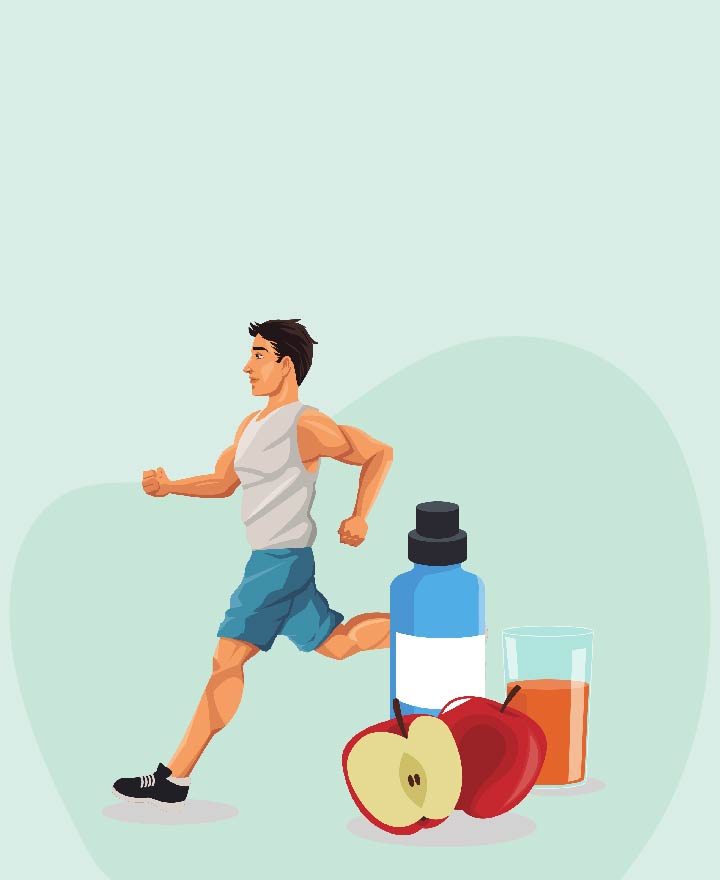

Signs and Symptoms of Protein Deficiency
Proteins are the building blocks of your body. They play an essential role in all body tissues. Its deficiency can lead to various health problems. Read on to know more.
What is Protein Deficiency?
Protein deficiency is when your intake is unable to meet your body’s requirements. Too little protein may cause changes in body composition that develop over a long period of time, such as muscle wasting. The most severe form of protein deficiency is known as kwashiorkor, commonly seen in children in developing countries.
Symptoms of Protein Deficiency
This includes -
1. Edema
It is characterised by swollen and puffy skin. This is a classic symptom of kwashiorkor.
2. Bloated Belly
This is another characteristic sign of kwashiorkor. This occurs because protein deficiency may lead to fluid buildup inside the abdominal cavity.
3. Fatty Liver
This is another symptom of kwashiorkor in children. In worst case scenarios when left untreated, it may lead to liver failure.
4. Skin, Hair, and Nail Problems
Protein deficiency can cause redness, flaky skin and depigmentation. It may also cause brittle nails and hair loss.
5. Loss of Muscle Mass
Protein is essential for muscle growth and maintenance and its deficiency can result in loss of muscle mass.
6. Increased Infection Risk
Low protein levels can harm your immune system thereby increasing your risk of developing infections.
7. Increased Appetite
Low protein levels can increase your hunger cravings which are often fulfilled by unhealthy food items.
How Much Protein Do You Need?
Between 10% and 35% of your total calories should come from protein sources. This number varies depending on your body composition, health, activity level and type, and your goals.
Recommended Daily Intake (RDI)
The RDI of protein for women aged 19–70 years is 46 grams per day.
The RDI of protein for men aged 19-70 years is 64 grams per day.
Women over 70 should have at least 57g per day.
Men over 70 should have over 81g per day.
Conclusion
Protein is found everywhere in your body - your muscles, skin, hair, bones and blood. For this reason, protein deficiency has a wide range of symptoms. For optimal health, make sure to include protein-rich foods in every meal.
FAQs
1. What happens when your body is low in protein?
In case of low protein in your body, you may experience severe tiredness, hair loss, edema (swelling caused due to extra fluid buildup in the body tissues) and other severe infections.
2. What might the 5 signs of a protein deficiency be?
The 5 most common signs of protein deficiency are dry skin, hair loss, increased appetite, edema, and increased instances of infections.
3. How do you fix low protein levels?
Eating protein-rich foods is the only way to fix low protein levels. Include foods such as fatty fish, legumes, lentils, lean meat, eggs, nuts, and low-fat dairy products in your daily diet.
4. What are the main causes of protein deficiency?
The major cases of protein deficiency are liver problems, eating disorders, pregnancy, kidney-related ailments, inflammatory bowel disease and malnutrition.
One of the important components of our overall wellness is also being financially secured. Healthcare emergencies can happen any time, but a good health insurance can protect you from such uncertain situations. To know more about it, click here
Source: WebMD, Healthline, Prevention
Disclaimer: This blog provides general information and discussions about health and related subjects. The information and other content provided in this blog, website or in any linked materials are not intended and should not be considered, or used as a substitute for, medical advice, diagnosis or treatment. Kindly contact your Doctor before starting a new medicine or health regime.
Related Articles
10 signs and symptoms of Iodine deficiency
9 signs that you are not eating enough
Calories how much to eat and how much to restrict
Last Updated on February 03, 2025
Published on April 11, 2023
























 Health Insurance
Health Insurance  Travel Insurance
Travel Insurance  Car Insurance
Car Insurance  Cyber Insurance
Cyber Insurance  Critical Illness Insurance
Critical Illness Insurance
 Pet Insurance
Pet Insurance
 Bike/Two Wheeler Insurance
Bike/Two Wheeler Insurance  Home Insurance
Home Insurance  Third Party Vehicle Ins.
Third Party Vehicle Ins.  Tractor Insurance
Tractor Insurance  Goods Carrying Vehicle Ins.
Goods Carrying Vehicle Ins.  Passenger Carrying Vehicle Ins.
Passenger Carrying Vehicle Ins.  Compulsory Personal Accident Insurance
Compulsory Personal Accident Insurance  Travel Insurance
Travel Insurance  Rural
Rural